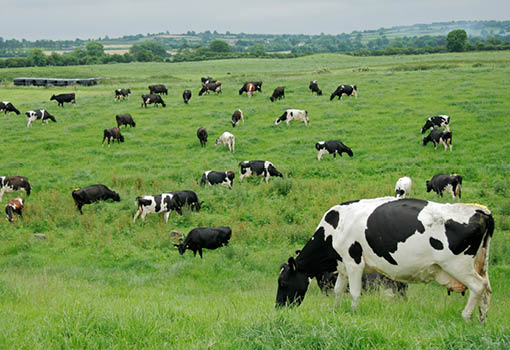Our industry is moving towards a new way of working, focusing more on sustainable and efficient farming methods, improved quality of dairy products, and increased profitability. You can achieve this by simply balancing amino acids — a process that requires the formulation of diets to include both Lysine and Methionine.
There are numerous benefits when you formulate the diet of ruminants in terms of looking at metabolisable protein and then formulating it by covering limiting amino acids — maximising dairy cow productivity, better allocating available raw materials, improving nitrogen efficiency, reducing dietary crude protein level, improving milk quality, preventing health issues, and much more.
Amino acid implementation means better farm management, improved feed efficiency and animal health, as well as a more flexible and precise formulation.
One of the ways in which we can work towards improved sustainability is through our Life Cycle Impact Assessment — a holistic approach in which we look at how our solutions contribute sustainably. This is done by means of a reduction in CO2-eq per kilogram of compound feeds to the final animal diet, through our foods, through the complete value chain to improve feed efficiency, animal productivity, and welfare. As a result of these activities, one can experience improved feed efficiency and overall profitability.
Life Cycle Assessments are one of the ways in which we study the entire value chain using data-driven methods. We can accurately evaluate the environmental impact of our actions and remain agile in our consistent and dedicated attempts at improving our solutions and practices. In turn, this helps us in meeting our customers’ needs when it comes to improved sustainability.
In order to measure the global warming potential, the Life Cycle Impact Assessment tool, that evaluates the potential environmental impact of a product or activity throughout its life cycle. We believe that Life Cycle Impact Assessments should be viewed as a holistic approach in which our solutions contribute to sustainability by reducing the CO2-eq per kilogram of food and improving animal productivity, welfare and profitability. The impact of this is expressed in terms of carbon dioxide equivalents (CO2-eq), a unit used to compare the warming of a greenhouse gas with carbon dioxide which would have an equivalent impact.
The carbon footprint is the level of greenhouse gas emissions produced by a particular activity or product. And this can be measured through the Life Cycle Assessment, expressed in terms of carbon dioxide equivalents, a unit used to compare the warming of a greenhouse gas with carbon dioxide, which would have an equivalent impact.
Together with FORCE Technology, an independent, specialized external provider, we have identified the most accurate values of all our rumen-protected amino acids. If you’re interested to learn more about this, feel free to contact us.

We all know that rising greenhouse emissions have elevated concerns about the impact on the planet and the effects of climate change. Consequently, the United Nations established the 17 Sustainable Development Goals which aim to improve this situation and to restore and promote social, economic and environmental sustainability.
Goal 13 specifically states that we need to: “[t]ake urgent action to combat climate change and its impacts.” As such, actions need to be integrated into national policy, strategies, planning, and subsequently integrated into companies and businesses in our industry.
Therefore, identifying measures to reduce on-farm emissions can help in realizing this goal. This is why our work on ruminant nutrition is so crucial since it demonstrates the reduction of CO2 emissions by precision feeding. We want to share these insights and knowledge with our customers and encourage them to equally adopt practices that contribute to sustainability.
Amino acids play a crucial role in a more sustainable ruminant production. Balancing diets with rumen-protected Methionine and Lysine maximizes dairy herd profitability by maximizing MP utilization and dairy cow production and health.
Additionally, covering these first two limiting amino acids needs, with the use of our rumen-protected amino acids will decrease the overall excretions to the environment, improving both nitrogen and feed efficiency. And all of the above, with the same or less diet cost. Reducing the final CO2-eq contribution of daily formulations means improving the environmental impact. As of now, the amino acid formulation approach is critical to the ruminant sector and the benefits are significant — reducing nitrogen and CO2-eq excretion in combination with an improved feed efficiency enhances the operating account per kilogram of milk or meat produced.
Added to this, at Kemin, we believe in the value of partnerships in contributing to sustainability. Our mission is to sustainably transform the quality of life every day for 80 percent of the world — something we simply cannot do without the support of the entire industry.
Therefore, Kemin and Feedinfo have joined forces to create an exclusive webinar focusing firstly, on the possibility of ensuring a healthier planet without losing animal productivity, and, secondly on having a healthier planet whilst at the same time maintaining a healthy business/sector. In this webinar, three main partners give their insights: researchers and academic subject experts, the ruminant industry and Kemin, as rumen-protected amino acid supplier.
© Kemin Industries, Inc. and its group of companies 2026 all rights reserved. ® ™ Trademarks of Kemin Industries, Inc., USA
Certain statements may not be applicable in all geographical regions. Product labeling and associated claims may differ based upon government requirements.